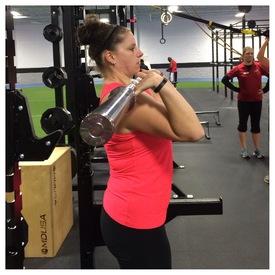New to Weights... First week lifting.. gained 4 pounds :(

kylieannfran
Posts: 102 Member
I've just started incorporating weights into my workout at the gym!
I feel great and my heart rate monitor proves im burning mass calories.
But i gained 4 pounds and kept to my caolories to a T!
If I keep lifting will I still lose weight?
I started keeping measurements too. So maybe that will help.
I'm just a little frustrated. I feel better than when i was just running. But when I got on the scale this mornig I was super bummed.
Any advice from anyone who is more expereinced with weights would be wonderful!
Thanks Ya'll!
I feel great and my heart rate monitor proves im burning mass calories.
But i gained 4 pounds and kept to my caolories to a T!
If I keep lifting will I still lose weight?
I started keeping measurements too. So maybe that will help.
I'm just a little frustrated. I feel better than when i was just running. But when I got on the scale this mornig I was super bummed.
Any advice from anyone who is more expereinced with weights would be wonderful!
Thanks Ya'll!
0
Replies
-
1. DO NOT use your HRM to determine a calorie burn during weight lifting. HRMs, to my understanding, are set up for aerobic/cardio activity, and ST is not that. You'll get an inaccurate burn, and if you're eating back a ton of calories, you could hurt your progress. But, you should count something and eat more on lifting days, If you feel you need it. (I use the ST under cardio exercises here on MFP. It's not a lot, but it's something.)
2. The weight gain is likely your muscles retaining water. Give it a month or so to even out. Definitely take measurements and rely less on the scale. I know it's easier said than done.0 -
if you've started weight lifting, it's time to let go of the scale for at least a month and rely ONLY on measurements.
if you try to weigh yourself, you'll be discouraged very quickly (sounds like you are already) but your body will begin changing in ways the scale can't show you.
JenMc is spot on with her advice!!
if you want, you could join a weight lifting group on here, you'll find a lot of information. stronglifts 5x5 for women is one i'm in, and i really enjoy it.
good luck! you'll have kickass muscles and will feel great!0 -
I gained weight when I started lifting too (like 5 pounds), but lost inches. My trainer said that's pretty common. The thing is, weight lifting will help you lose weight in the long run, so stick with it. Even after I gained that weight (and before I went back down again) my clothes got looser and my boyfriend asked me if I had "lost too much weight" so I know that even though the number was higher, I was thinner. Just drink plenty of water and make sure you're eating protein to help your muscles repair themselves.0
-
The above posts are right on. Give it time and stay away from the scale, it is water weight from muscles repairing themselves, this will happen everytime you up your weights or intensity. Take measurements and go by how your clothes fit. Don't get discouraged or give it up! Good luck!0
-
I just had the same thing happen to me two weeks ago when I started lifting heavy. I gained two kilos (4.4lbs) on the scale but I "know" I didn't gain weight. I stepped away from the scale since then and am just focusing on doing healthy, good things for my body and will weigh in next month.0
-
It's just water weight. Your muscles aren't used to being worked this way so they are breaking down and holding on to water while they repair themselves and get stronger.
Don't even bother with the scale for the next few weeks, and in my experience, never weigh in the morning after a major lifting session, the water weight will skew your progress.0 -
New to weight training too! My scales are showing a gain also.....and I'm so tired and hungry on wt days!
Will this get better? Aerobic activity usually gives me energy!0 -
New to weight training too! My scales are showing a gain also.....and I'm so tired and hungry on wt days!
Will this get better? Aerobic activity usually gives me energy!
It will get better!! Make sure you're eating enough protein on days when you lift. And drink tons of water. I used to feel this way, but I've found I'm actually using weights as a reward for myself now - like "okay, if you run two miles on the treadmill, you can get off and do weights." And it WORKS. You will see great results if you just keep it up!0 -
I've been lifting weights for almost two years now. It has taken me that long to lose just 22 pounds, BUT, my body has changed entirely. Everything looks tight, not flabby, and I am SO GLAD that I started lifting weights. Right now I only have one training session a week, but it is enough to keep me looking semi-lean (I have to lose at least 10 more pounds). Keep at it! Weight lifting also causes your muscles to retain water, so I am sure that is part of what is going on. Another thing, the previous poster is correct, I used to use my HRM to track weight lifting calories but found out that it is not accurate for lifting, only for cardio. So what I usually do is give myself at most 200 calories for a very intense 30 minute training session, sessions where I am not incorporating as much cardio, I may allow myself 100 calories. Keep at it, you will love the results!0
-
Echoing what everyone else has said.
stick to it and be patient
forget the scale and stick to pictures and measurement.
Trust me the weight may not budge but the body will surely show a difference just give it some time 0
0 -
Lifting weights helps build/maintain lean body mass and you should definitely being doing it if you want to have a lean muscular look ie "toned". Cardio can help with losing fat but also wastes lean body mass and can leave you looking "skinny fat" (for lack of a better term) if you do too much. Try not to worry about numbers on the scale. I know this is difficult but a tape measure will give you a much better picture of what's really happening to your body.0
-
also honey good chance you are aching like a cow!
 I know I do after a good weight session and you will for a while if so your body holds extra water from it....don't weigh everyday try to leave it as long as possible x 0
I know I do after a good weight session and you will for a while if so your body holds extra water from it....don't weigh everyday try to leave it as long as possible x 0 -
when you decide to start lifting you should also decide to stop using a scale.
muscle weighs more than fat, so if you are gaining muscle you will likely see the # increase
I weigh 2 pounds more than I did 4 months ago. my body looks completely different. i dont read a scale i look in the mirror. you are also surely retaining water and you will be ravenous for the first few weeks if you are lifting heavy so get prepared for that. your muslces are craving more food to repair and recover. you have to give your body 1-2 months to balance out, then its all up from there 0
0 -
It's just water weight. Your muscles aren't used to being worked this way so they are breaking down and holding on to water while they repair themselves and get stronger.
Don't even bother with the scale for the next few weeks, and in my experience, never weigh in the morning after a major lifting session, the water weight will skew your progress.
^ this is true, from what i've heard..especially if your pretty sore your body is holding onto water weight. Water is being pumped into your muscles, also when you run you lose water weight, so you're probably used to the scale saying less if you don't drink a lot of water. I'm in the same boat as you started lifting heavy this week about an hour of weight lifting and HIT running and I gained about 4 pounds. However when I used to lift weights with my boyfriend I lost 7 pounds out of no where and was able to keep it off because I had a higher metabolism, also you're continuing to burn calories even after your done lifting. Do it for at least 6 weeks and then look at the results. I've hired a very good trainer and he doesn't even weigh is clients, he just has them send a picture every week and the results are amazing! who cares what you weigh, if you keep at is you're going to look hot and have definition! stay encouraged, i know I'm trying to because I've seen it work before.0 -
I gained in the beginning in the first couple weeks and then the weight just flew off and I am leaner now then I have ever been in my life. It changed my life!0
-
My situation exactly! And I got most of the same information when I posted a thread about this last week
 Keep at it and good luck! 0
Keep at it and good luck! 0 -
Seems like I'm late to the party BUT better late than never.

As a personal trainer myself this is a question I've been asked many times by clients.
First of all, one of the benefits of exercise is that you improve your muscles capacity to store glycogen. Therefore, someone who trains frequently, like myself, will store 20-50% more glycogen in their muscles opposed to an individual who doesn't exercise. This is the weight gain most individuals, if not all, experience.
Ironically this gain of muscle glycogen enhances your muscles ability to spare glycogen and use fat also as a source of fuel instead of waiting for your glycogen storage to be deplete.
Why?
Because exercise develops mitochondria. Mitochondria is the powerhouse of your muscle cells where all of the energy is produced.
Our muscles use oxygen to burn fat or glucose in millions of mitochondria, which then produce the energy for your muscle to flex/contract.
All movement is fueled by the mitochondria.
With that in mind, let's talk about getting "in" shape. Exercise is all about making more energy in the muscles. That means building more mitochondria and bringing them more fuel and oxygen.
Depending on the energy demands of the activity you're participating in mitochondria can burn either fat or glucose. It's like having a hybrid vehicle that can run on hydrogen (fat) AND gasoline (glucose), depending on your needs: hydrogen AND gas for long-distance trips, high-octane gasoline for speed.
Your muscles prefer to burn fat most of the time, because it's a more efficient fuel, but for intense exercise, for speed and power, you burn glucose like a jet burns through gas.
However, it's not about how much fat you burn during an exercise session, it's about how much calories you burn.
You often here or read that one will burn more fat when they train at 65-75% of their maximum heart range (220-age). However, we don't care about % we care about how many calories we burn otherwise the same we would just lay in bed all day because the same is true when you are at complete rest. At rest, and with light exercise, you burn 95% fat and 5 percent glucose. You guys can try that and tell me how it works for you.
Most fat isn't stored in your muscles; it's stored around your stomach and hips and in a few other locations. Your body has to bring it to your muscles through your circulation (movement). The trouble with this is that your capillaries (the tiny blood vessel in which oxygen, water and fat pass through to enter the muscles) can handle only a few fat molecules at a time. So each capillary can deliver only a trickle of fat to your mitochondria.
With consistent intense training (80-85% of your maximum hear rate), your body builds new networks of capillaries to bring more fat to your muscles. Eventually, you're delivering as much fat as possible while shedding inches away.
Be patient though because a lot of infrastructure has to take place within your body for this to occur.
With harder exercise you keep burning fat in the background, but all the extra energy/calories comes from burning glucose. Most of the glucose is stored in your muscles ahead of time giving your muscles a fuller and tighter appearance, but your circulation gets a double workout, first bringing in more glucose and the oxygen needed to burn it, then carrying away the byproduct.
Any way you look at it, circulation (movement) is the best way to lose inches the fastest - which is another reason why trainers today stress movement to their clients and not sets & reps on a machine.
Movement will impose a larger demand on your muscles in groups instead of just isolating one or two muscles, which will place a instense stimulation for the creation of new mitochondria, the storage of more glucose in the muscle cells and the growth of new capillaries to feed them.
Eventually, you will see your body composition change. Keep this in mind though, there are many ways to measure results other than just the number you see on the scale. Trust me, you will lose inches.
Now lets just say (for the sake of it) you hit a weight loss plateau.
There are many reasons for hitting a weight-loss plateau. For example let's assume you're undereating (which can trigger fat storage). Your metabolism may just need a workout of its own. Though the following may sound counter intuitive to what immediately comes to mind: working out harder and eating a bit more will improve your ability to break down food.
Additionally, In order to reach optimal results from exercise you have to include both aerobic (for at least 30 minutes) & strength training on a regular basis, 3 - 5 days a week is best.
As a personal trainer I often here people in day-to-day converstion say they don't have the energy to exercise so often; however if you exercise on a regular basis, you will increase your energy levels. The reason why you don't have the energy is because you don't exercise.
Also, It's not enough to exercise for just a couple of days a week, no matter how high the intensity and how long the duration of the exercise. The benefits of exercise are short term, when you stop regular exercise you begin to lose the mental motivation and physiological benefits so frequency is a must. You HAVE to shoot for 4-5x's per week at least.
If fatigue is a issue, then begin exercising in small amounts until you slowly build up a tolerance. As your level of fitness improves you can increase either the frequency, duration, or intensity of your exercise.
• Frequency of Exercise: You should exercise at least three days a week, preferably 4-5x's a week.
• Duration of Exercise: refers to the time you've spent exercising.
When it comes to cardio, not including the warm-up and cool-down, you should vary from 20-60 minutes to gain cardiorespiratory and fat burning benefits.
• Intensity of Exercise There are several ways to monitor the intensity. The best way to test the intensity is to take your heart rate during the exercise and just before the cool-down.
These 3 components have to constantly be varied in order for you to continue seeing ongoing results.
Hope you enjoy the science behind your weight gain.
Best Regards!0
This discussion has been closed.
Categories
- All Categories
- 1.4M Health, Wellness and Goals
- 398.1K Introduce Yourself
- 44.7K Getting Started
- 261K Health and Weight Loss
- 176.4K Food and Nutrition
- 47.7K Recipes
- 233K Fitness and Exercise
- 462 Sleep, Mindfulness and Overall Wellness
- 6.5K Goal: Maintaining Weight
- 8.7K Goal: Gaining Weight and Body Building
- 153.5K Motivation and Support
- 8.4K Challenges
- 1.4K Debate Club
- 96.5K Chit-Chat
- 2.6K Fun and Games
- 4.8K MyFitnessPal Information
- 12 News and Announcements
- 21 MyFitnessPal Academy
- 1.5K Feature Suggestions and Ideas
- 3.2K MyFitnessPal Tech Support Questions














